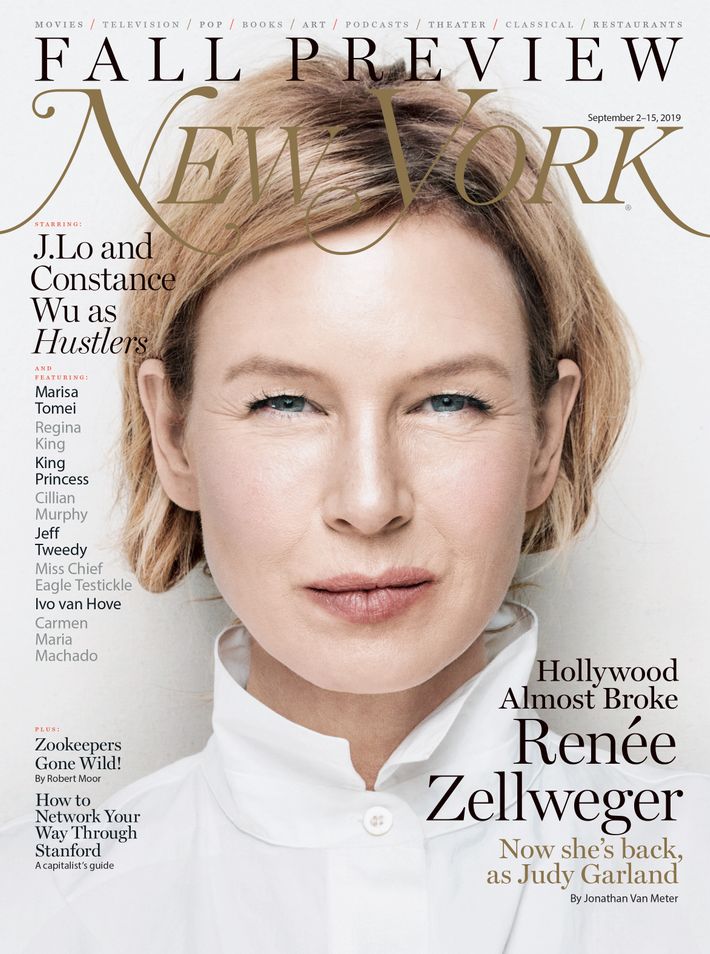1 For the cover of New York’s “Fall Preview” issue, Jonathan Van Meter profiled Renée Zellweger (“Renée Zellweger’s Lost Decade,” September 2–15), who is soon to star as Judy Garland in the biopic Judy. On Instagram, huntlodge commented, “Good for her! Hollywood uses people up and discards them. She stepped aside and prioritized her life … then came back strong, looking better than ever!” And pietrofhnyc wrote, “She seems so un–Judy Garland–like that I can’t wait to see her play the role. But I hope she captures the innate humor Judy had along with the pathos and insecurity.” But unger_xx chafed at the headline: “I wouldn’t call it a ‘lost’ decade. Time off can be extremely fruitful. Not everything of value in life is public.” Added sophiegruetzner, “Lost decade? Bridget Jones’s Baby was just three years ago.” @__adamwhite commented, “This is a remarkable profile that fully burrows into that fascinating blur of strength, vulnerability, and mad eccentricity that has always made Zellweger such a brilliant movie star.” Will Kellogg wrote the story made him “excited for Judy in a way the trailer did not.” Zellweger’s performance in Judy, which premiered at the Toronto International Film Festival, inspired a standing ovation, prompting one critic to write, “In 15 years at #TIFF I have never seen a standing ovation like the one for Renée Zellweger … it only stopped because she made us.”
2 In “How to Major in Unicorn” (September 2–15), Max Read and Andrew Granato assembled a cynic’s guide to excelling at Stanford University. Cécile Alduy, a French-literature professor at the school, wrote, “This article is only about computer-science students. But I’ve had some in my … classes that had entirely different, humanistic attitudes. And the majority of Stanford students do not major in CS. What a relief.” Two humanities majors wrote a rebuttal post on Medium — “An Optimist’s Guide to Finding Meaning at Stanford” — arguing that the guide perpetuates the myths “that it is not only full of ‘techies’ but that those techies only care about self-enrichment, networking, and personal success.” Other alums saw glimpses of their time at the school. Naotake Murayama wrote, “There’s some truth, some useful tips, and lots of required reading between the lines.” @richjaro tweeted, “To stories about athletics scandals, academic cheating, and campus assault, you can add this to the list of things you never want to see written about your alma mater.”
3 “The world’s five most powerful millennials now, and maybe for the rest of our lives, are Jared Kushner, Kim Jong-un, Mark Zuckerberg, Stephen Miller, and Mohammed bin Salman,” Noreen Malone argued in “The Five Millennials Changing the World” (September 2–15). Commenter almost.literature wrote, “The idea that Miller and Kushner are being portrayed in this piece as serious long-term power brokers in the United States—let alone internationally—is just ludicrous. Neither has enough credibility in their appointed fields to provide even a hint of gravitas.” Heidi N. Moore disagreed. “The next time millennials say they inherited a messed-up world, remind them that, like all generations, they also have a significant hand in making it worse … Kushner, Miller, and Zuckerberg alone have enabled a level of authoritarian cynicism and genocide that makes any Boomer look like an amateur.”
4 In an essay for the Cut, Natalie Beach reflected on her years-long relationship ghostwriting for the infamous Instagram influencer Caroline Calloway (“I Was Caroline Calloway,” September 10). Within 24 hours, the story had been read by half a million people and prompted the New York Times to write “Who Is Caroline Calloway? An Explainer” and a BuzzFeed quiz, “Are You a Caroline or a Natalie?” Zing Tsjeng called the essay “a real-life Elena Ferrante story for the Instagram generation.” The novelist Curtis Sittenfeld asked, “Was this essay written for my personal delight?” Amanda Fortini wrote, “The main takeaway from this Caroline Calloway piece (other than Natalie being a fantastically sharp writer) is how absolutely shitty and miserable your twenties are.” Others, though, questioned the writer’s motivations, with Mother Jones’s Clara Jeffrey tweeting, “Maybe if I’d ever heard about Caroline before today I’d read this as something other than essentially becoming and betraying the thing you feel betrayed by.” Hadley Freeman wrote, “This a great piece of writing about a friendship that is morally complicated on both sides.” The journalist Peter Sterne added, “I thought this would be an exposé of an Instagram scammer, but it’s actually a compelling reflection on toxic friendship and the experience of being a young woman in the early 2010s. I hope Natalie writes a memoir.”
Send correspondence to comments@nymag.com. Or go to nymag.com to respond to individual stories.
*This article appears in the September 16, 2019, issue of New York Magazine. Subscribe Now!

